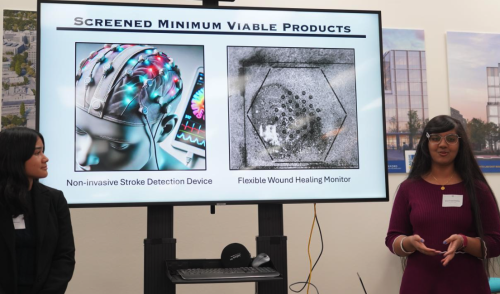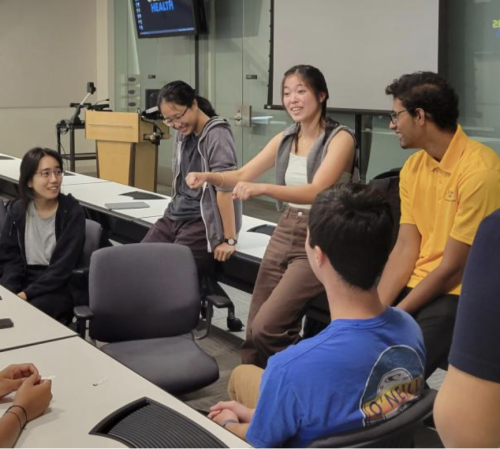Biomedical Engineering: A bench-to-bedside experience at UC Davis Health
Who should take this experience?
Biomedical engineering undergraduate students who want to enhance their knowledge of engineering design and gain exposure to the clinical environment.
The courses align with the junior year BME major curriculum, offering practical exposure to both clinical settings and industry-relevant topics. This will serve as a solid foundation for the senior design course and will be valuable for students planning to work in industry or pursue a higher degree in academia.
Offered Fall 2025
- Max enrollment: 12 students
- Prerequisites:
- Complete all lower division required coursework before program start date and be in good academic standing
- Courses:
- MAT 21A-D
- MAT 22/27AB
- CHE 2A-C
- BIS 2A
- PHY 9A-C
- ENG 6
- ENG 17
- The application process consists of three competitive stages:
- Application Submission: Eligible students must complete the Quarter at Aggie Square application.
- Group Interview: Selected applicants will be invited to an in-person group interview with program faculty at UC Davis Health in mid-May.
- Secondary Interview (if needed): Some students may be asked to complete a secondary interview.
- Final selection notifications will be sent by early June.
Cost: Program fees are included in undergraduate students’ tuition and fees. There are no additional program fees to participate.
The Biomedical Engineering experience application for Fall 2025 will be open April 7-April 25, 2025. Stay updated with the Fall 2025 application and activities by filling out our student interest form.
This experience offers biomedical engineering (BME) majors an opportunity to engage in an authentic clinical needs-finding experience. Students will receive in-depth instruction in the industry-relevant tools and methods used in the product design and development process. Students participate in clinical observations and procedures at UC Davis Health, network with healthcare and industry professionals and work closely with faculty and peers in a small, supportive cohort setting. Programmatic emphasis will be placed on enhanced exposure to critical topics including clinical workflow, FDA and device regulation, standards, and entrepreneurial mindset in the clinical setting.
Curriculum
FACULTY & BIOMEDICAL ENGINEERING SUPPORT TEAM
- Xianglong Wang, Assistant Professor of Teaching, Biomedical Engineering
- Jennifer Choi, Associate Professor of Teaching, Biomedical Engineering
- Steven George, Department Chair and Professor, Biomedical Engineering
- Aijun Wang, Professor, Surgery and Biomedical Engineering
- Jinhwan Kim, Assistant Professor, Surgery and Biomedical Engineering
- Wenting Gao, Instructor, Biomedical Engineering
- Donald V Chigazola, Instructor, Biomedical Engineering
COURSES*
- BIM 180 — Clinical Needs in Healthcare Settings (5 units)
- Students will gain a deeper understanding of the role of needs finding in the engineering design process through the identification of strategic focus areas, observations in the needs exploration process, and analysis and development of relevant needs statements. Students will be applying these strategies through a practicum experience in which they will undergo clinical immersion through observations in Surgery and other clinical departments at the UC Davis Medical Center. BME Engineering Elective. Taught by Dr. Jinhwan Kim and Dr. Aijun Wang
- BIM 170 — Aspects of Medical Device Design & Manufacturing (2 units)
- The class describes the product development lifecycle used in biomedical innovation and design from concept generation through post-market activities. Major topics include concept generation and screening, product development, product transfer, manufacturing, clinical studies, intellectual property strategies, and post-market activities. BME Engineering Elective. BIM 170 will be held at the UC Davis campus for Fall 2024. Taught by Donald Chigazola
- BIM 189C — Entrepreneurship in Biomedical Engineering (3 units)
- This course is designed to provide students the opportunity to learn how to work with health and medical professionals to better address the nation’s emerging healthcare challenges. Using Lean Startup Theory, this course will provide a platform that can develop solution prototypes that match healthcare users’ needs in just weeks, rather than months or years. Students will work with healthcare and industry professionals, including investors, who may provide follow-on funding to student teams for further refinement and development of solution prototypes. Taught by Wenting Gao
- BIM 199 — Special Study for Advanced Undergraduates (2 units)
- Special study for advanced undergraduates that includes research experience at Aggie Square.
*Courses subject to change.
Downloadable Final Presentations for BME Experience

New medical technology emerges from Quarter at Aggie Square program
The Quarter at Aggie Square Biomedical Engineering cohort wrapped up their 10-week experience with a presentation of three medical prototypes for growth-accommodating heart valves, noninvasive glucose monitors and stroke-detection devices. The students chose the concepts to solve complex health challenges they encountered.

Immersive Biomedical Engineering Experience for Undergrads Now 'Whole Package'
The Department of Biomedical Engineering has coursed a triangle of clinical know-how, manufacturing ability and entrepreneurial skill for the redesign of its Quarter at Aggie Square Experience. Learn more about how the program integrates courses on the development of new medical devices, entrepreneurship in biomedical startups and the principles of the manufacturing process, from device design to profitability,

